 How critical is media literacy when our various digital skills and engagement with technology fail to intersect with our ability to identify ideologies and asymmetries within the media? LSE PhD researcher Afroditi Koulaxi examines why media literacy can be a problematic concept in the Greek migrant context after her recent fieldwork in Athens.
How critical is media literacy when our various digital skills and engagement with technology fail to intersect with our ability to identify ideologies and asymmetries within the media? LSE PhD researcher Afroditi Koulaxi examines why media literacy can be a problematic concept in the Greek migrant context after her recent fieldwork in Athens.
In an effort to uncover how face-to-face encounters with migrant populations in a multicultural neighbourhood might challenge mediated representations of the respective groups (and vice versa), I deploy online ethnographic participant observation and in-depth interviews with Greek citizens from various socio-economic backgrounds in my PhD research.
Networks of mediation create the notion of a multicultural neighbourhood, which then becomes part of a national imagined identity. These imagined identities reaffirm boundaries between “us” and “them” (especially where migrants are concerned) to limit or expand spaces of acceptance, with deeply entrenched stereotypes and fears being reproduced over time. They create parallel realities that take the experience of the neighbourhood in the hyper-real space; and this imagined space can become more real than the real.
A Greek paradox?
My research focuses specifically on the lively multicultural neighbourhood of Kypseli in the heart of Athens, which is home to approximately 50,000 people predominantly from the middle- and working class. While the area used to be favoured by more affluent citizens due to its central Athens location, the last century has seen wealthier citizens move to the outskirts thus bringing a decline in the property prices in Kypseli. Now the neighbourhood is home to locals from various socio-economic backgrounds, – and predominantly lower middle and working class individuals – including established and new migrant populations.
Greeks in Kypseli frequently make reference to their own stories, prior experience with migrant populations, as well as their mediated encounters. By the latter, I mean any information that is not experienced first-hand, such as what people tell them about their experience with migrants or what they see on social media platforms and/or ‘traditional’ media about migrants.
My findings show a dependence on media, which is completely normalised, in everyday life. In a way, this dependence amounts to an almost banal trust in the media. People I spoke to constantly referred to the media in order to try to legitimise their views – something that constitutes a paradox of the mediated society, considering that the majority of my participants is well aware that the media are created, manipulated, and even faked.
However, when I asked participants to reflect on their media experiences in a more conscious and reflexive manner, it appeared that they understood media literacy as a distrust of the media. One middle-class woman shared her fear of foreigners with me, because “on a daily basis, crime news is full of burglaries by foreigners. The majority of news bulletins is dedicated to such news.” She, however, insists that she does not believe in such media portrayals:
“Every TV station and journalist reports events from a given political spectrum. Thus, I try to find out the truth on my own, by watching the news from different media outlets, from different political alignments. It’s not about the reporting, it’s about the interpretation of the reporting. It’s the way they portray certain events.”
Another participant spoke of media representations in general that make him feel insecure in the neighbourhood:
“You don’t hear people speaking in Greek. I don’t let my wife and daughter go through the main square. I always go with them. I have a feeling my daughter feels insecure. We read about this on the online news platforms, people talk about this in the neighbourhood.”
The man also spoke about the measures he takes to protect himself and his daughter online when browsing through Greek media and using media technologies in his everyday life:
“I don’t want to upload an image of myself. I communicate with friends and read the news, but my face doesn’t appear anywhere on Facebook. I don’t want to ‘advertise’ my daughter. There is no reason for this. Whoever wants to access my profile will find a way to do so. It’s about online protection.”
The role of mediation
Does mediation – including different modes of communication, from face-to-face encounters in the city to the digital encounters on social media platforms – drive and guide experience?
The working- and middle-class people of Kypseli who I interviewed can be described as media literate. They constructively use social media platforms to promote their work and communicate with their customers and have concerns about online surveillance and privacy.
However, my preliminary findings indicate that:
- The nature of their media literacy is curtailed and subjected to racial and socio-cultural orders that justify discourses that are often completely contradictory to their (functional) literacy skills.
- Their cultural capital (including education and lifestyle) does not prevent them from circulating and believing misinformation and stereotypes that are being reproduced over time.
- Their awareness of power relations and asymmetries within the media does not necessarily equate with a media literacy that is duly conscious of the way people build their perceptions around established and recent arrivals of migrant populations.
Why are these initial findings from Kypseli potentially problematic?
Despite individuals’ functional and even critically-minded media literacy, as well as their cultural capital, they reproduce stereotypes and racial mediated discourses. An explanation could be that this kind of media literacy is always subject to political/ideological alignment, which consequently justifies discourses that might be contradictory to people’s (functional) literacy skills. The fact that people realise the power relations in the media does not necessarily lead to a level of media literacy that is fully conscious of the way people construct their views around migrants and refugees. Thus, it is vital to explore media literacy within a complex system of mediation, where the media, ideology, racism and structures of inequality have a role to play.
This article gives the views of the author, and not the position of the Media@LSE blog nor of the London School of Economics and Political Science.



